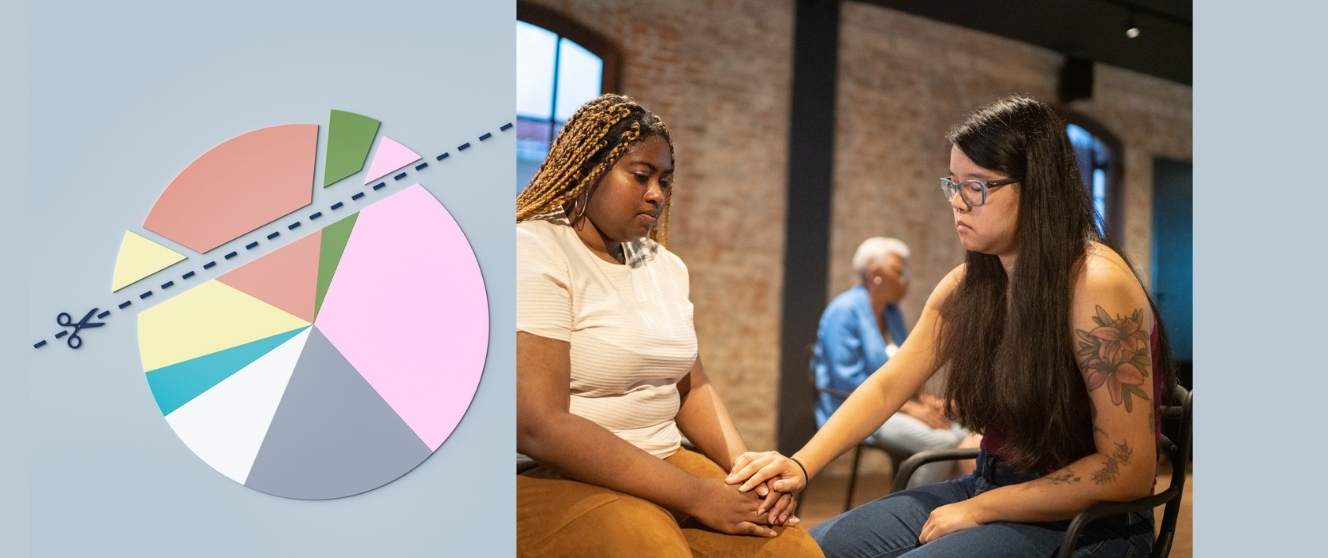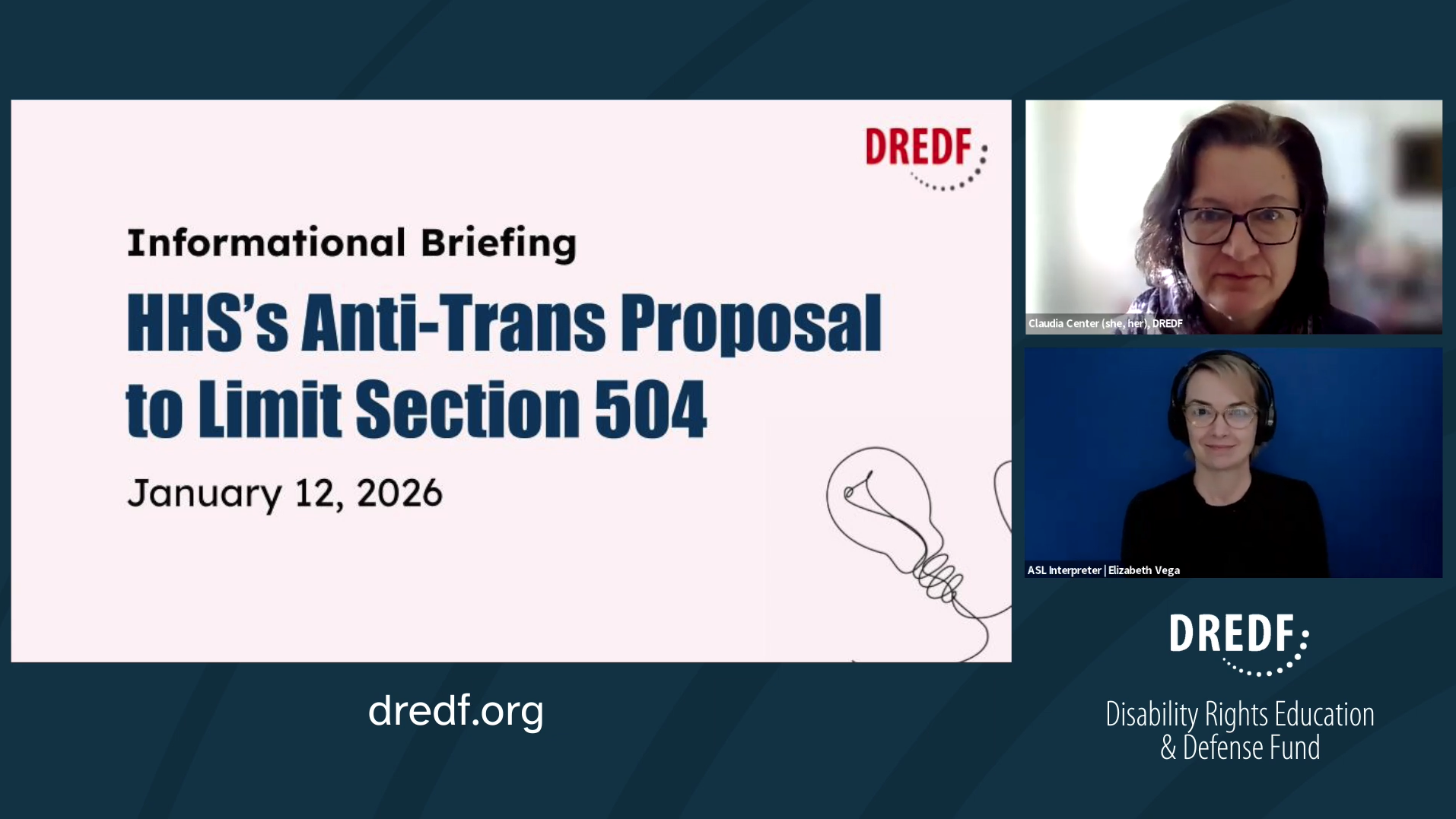
This page is being preserved for historical record and future reference, even though it may no longer be actively used or up to date.
Esta página ahora está disponible en español →
This page explains what Medicaid and Medicare are and why these programs are important for people with disabilities. Learn more about what is under attack and what you can do to help protect your healthcare.
If you need a plainer language resource about how to protect Medicaid, check out Autistic Self Advocacy Network’s Protect Medicaid Action Alert.
What is Medicaid?
Medicaid (called “Medi-Cal” in California) is a public health insurance program. Almost 80 million people in the United States use Medicaid or the Children’s Health Insurance Program (CHIP) to pay for their health care. This includes 17 million people with disabilities and older adults and 6 million children with disabilities. Every state has Medicaid. The federal government and the states pay for Medicaid.
What is Medicare?
Medicare is a public health insurance program. Medicare was created by the Affordable Care Act. Medicare helps older adults who are over 65 and some people with disabilities who are under 65 pay for their health care and medications. There are many different types of Medicare coverage. 68.5 million people in the United States use Medicare. Over 90% of people on Medicare are over 65.
Why are Medicaid & Medicare Important for People with Disabilities?
Medicaid pays for services and supports that are essential to people with disabilities. Medicaid covers doctors’ appointments, medicine, wheelchairs, walkers, hearing aids, treatments, tests, dental care, and surgeries. It pays for personal care attendants that help people live at home, eat, get dressed, and go to work. It can fund supported employment, supported housing, and transportation.
- Community Living: Medicaid helps adults with disabilities and older adults live in their own homes and communities instead of with their parents or in hospitals and nursing homes. Medicaid also helps children with disabilities live with their families instead of in an institution. It pays for 70% of personal care services – also called home and community based services (HCBS) – which are largely not covered by Medicare or private insurance. These services help people with disabilities live and work in their communities. More than 1 in 3 working adults with disabilities use Medicaid to meet their care needs. Medicaid HCBS is extremely popular. There are more than 9,000 people in California and 700,000 people nationwide on HCBS waiting lists.
- Kids with Disabilities: Medicaid is also one of the biggest funding sources for K-12 public schools. Medicaid’s school-based services support children with disabilities. They cover speech and occupational therapy, mental health counseling, specialized medical equipment, and transportation. Medicaid also helps to identify and support children with delays or disabilities as early as possible by funding developmental screenings, evaluations, and early intervention services for infants and toddlers.
Medicare is how most older adults in the United States pay for their healthcare. Many older adults acquire disabilities as they age. Without Medicare, many people would be uninsured and would have a hard time paying for healthcare on their own. Before the employment-funded Medicare program started, over 45 million people in the United States did not have insurance. In 2023, the number of uninsured people had dropped to 25.3 million thanks to Medicare and Medicaid expansion. Medicare also provides health insurance to some people under 65 with disabilities. This includes people who have been receiving Social Security Disability Insurance (SSDI) for more than two years. People who receive SSDI are unable to continue working because of their disability. In 2012, 65% of people under 65 on Medicare had a cognitive or mental health disability. Medicare Part D also helps many people pay for expensive medicine.
How Do I Know If I Have Medicaid?
Medicaid goes by different names in different states. You can learn if your health insurance program is a Medicaid program by checking this list. You can also enter the name of your state in this tool to get the name Medicaid has in your state. Some people use Medicaid by itself. Other people use Medicaid with other insurance. For example, if you have a “waiver,” use Children’s Special Needs Services, or if you are a “dual-eligible” person, your health insurance includes Medicaid programs. Expand the accordion to read more.
If you’re still not sure if you have Medicaid, you can contact your state Medicaid office and ask if you are covered by Medicaid. The office will ask you to tell them some personal information. Then the Medicaid office will tell you whether you receive any services that are covered by Medicaid, or if you are able to sign up for health care services under Medicaid.
State Health Plans
Some people who use Medicaid can go to any doctor that accepts Medicaid insurance. Other people get Medicaid through state health plans. Even though it may seem like you’re only getting services directly through the health plan, you are still enrolled in a Medicaid program. In California, there are many state health plans that are funded by Medicaid (Medi-Cal), and they have many different names.
Waivers
Some people with high health care needs may get services through Medicaid Waivers. Waivers can pay for more hours of personal care assistance at home or additional community services like adult day care for adults with disabilities. Waivers cover all Home and Community Based Services (HCBS) that allow people with disabilities to live in their communities instead of in nursing homes or institutions. If you have a “waiver,” you are a Medicaid recipient.
You can use this search tool to identify your state’s Medicaid waivers. Do waivers pay for your services? If yes, Medicaid cuts could affect you.
Children with Disabilities
Some disabled children with high health care needs may qualify for Medicaid or CHIP even though their family income is above the level that Medicaid usually requires.
Some working parents may have private health insurance that covers their child with disabilities. Sometimes, these families still have Medicaid as backup that pays for things that private insurance won’t pay for.
Medicare plus Medicaid (Dual Eligibility)
Some people who are low-income can get health insurance coverage through both Medicare and Medicaid. This is called being “dually eligible.” Dually eligible people have Medicare coverage as their main insurance, and Medicaid covers additional things. Medicaid might cover Medicare payments and co-payments. Medicaid may cover other services like personal care attendants or wheelchairs that Medicare won’t cover. These services can be very expensive. Without Medicaid to cover the cost of things Medicare does not cover, many people would not be able to pay for the things they need on their own.
Remember: Cuts to Medicaid Are a Cut to Medicare! Medicaid directly helps many Medicare recipients. Nearly 30% of Medicare dollars support Medicare recipients. Over 12 million Medicare enrollees rely on Medicaid’s help to pay their premiums. Without Medicaid, low-income older adults or disabled Medicare users would face gaps in their care that put their health and independence at risk. Learn more in this March 2025 issue brief and this February 2025 factsheet.
Family Caregivers
In some states, Medicaid can pay family members to provide personal home care for their loved ones with disabilities. In these situations, losing Medicaid means less money for the family, and less care attendant to support family members who provide care. It may also mean less therapies for disabled students at school.
Medicaid & Medicare Are Under Attack
Elected officials in Washington, DC, are trying to cut health care by over $1 trillion, including $800 billion in cuts to Medicaid, $300 billion in Affordable Care Act cuts, and $500 billion in Medicare cuts RIGHT NOW!
Elected officials are people that United States citizens vote for to represent them in the government. Elected officials include United States House Representatives, Senators, and the President of the United States.
A “cut” is a decrease in the amount of money that goes to Medicaid and Medicare programs. Cuts to Medicaid and Medicare go by lots of names like “work requirements,” “community engagement requirements,” “eligibility requirements,” “FMAP changes,” and “cost sharing changes.” No matter what elected officials say, these are cuts. They will cause millions of people to lose their health care. They will hurt low income people with disabilities, older adults, kids, immigrants, transgender people, pregnant people, and Black and Brown communities.
What is Happening in Congress Right Now?
Some elected officials want to cut Medicaid and Medicare because they want to use the money for other things that will not help most disabled people. These elected officials are trying to do this by passing a budget bill that changes the United States budget to give less money to Medicaid and Medicare over 10 years.
Elected officials in the House of Representatives already passed a version of the budget bill that cuts Medicaid and Medicare by at least $1 trillion dollars. This includes $800 billion in Medicaid cuts and $300 billion in Affordable Care Act cuts. Another $500 billion will be cut out of Medicare because tax breaks for the rich will increase the county’s debt. The bill also cuts other basic needs programs like SNAP. The reductions in essential services like food assistance will hurt many of the same people affected by the Medicaid cuts. Next, the budget bill will go to the Senate for a vote. We must stop the Senate from passing the budget bill because it will harm people with disabilities, our families, friends, and neighbors.
What Does The Budget Bill Do?
The budget bill’s huge cuts to Medicaid and Medicare programs will affect every person on those programs because it will destroy healthcare systems. It prevents people from being able to put food on their tables. The federal cuts will tempt states to provide fewer options for getting personal assistance in our homes instead of institutions. It also reduces protections to make sure people can have clean air and water. It even tries to stop our state and local governments from making laws that will require the use of Artificial Intelligence (AI) to be open and fair.
The bill targets already vulnerable low-income people, people with disabilities, students, immigrants, transgender people, and Black, Brown and Tribal communities. The bill is cruel and unacceptable.
Some of the things in the budget bill that will hurt people with disabilities, our neighbors and families, include:
Job loss penalties for people on Medicaid.
Republicans’ “work requirements” are really job loss penalties. Anyone applying for Medicaid would have to prove that they work, volunteer, or study for a minimum number of hours each month. Job loss penalties would make it harder for many people with disabilities and their caregivers to get Medicaid, even if they are eligible. People will lose access to Medicaid coverage they already have, and many people will have a harder time getting Medicaid coverage, even if they are eligible because of the complicated process of proving work. If people lose their job they are likely to lose their healthcare. Without healthcare many people will not be healthy enough to work. Job loss penalties cost states lots of money to enforce. This money should be spent on providing services, supports, and care, not on tracking people’s working hours.
Increased requirements to prove Medicaid eligibility.
Right now, people who have Medicaid need to prove that they are eligible for the program one time each year. The budget bill would make people prove they are eligible for Medicaid every six months. This makes it harder for people who have Medicaid to stay on Medicaid.
Punishing states that offer healthcare to undocumented or lawfully present immigrant communities.
The budget bill makes huge cuts to Medicaid funding for 34 states and Washington DC that provide healthcare to immigrants with their own state money. This includes cuts to states that provide healthcare to undocumented pregnant people and children. These cuts would impact everyone that relies on Medicaid in that state and DC.
Cuts Medicaid funding and coverage for gender affirming care.
Right now, 25 states cover gender affirming care through their Medicaid programs. The budget bill would end Medicaid funding for gender affirming care for trans people of all ages. The budget bill would also tell states they cannot require gender affirming care coverage in their state Medicaid programs, even if the states are using their own funds to pay for it. This would hurt almost 300,000 trans people across the United States who get their health care through Medicaid. States are also not allowed to decide for themselves if gender affirming care would be part of that state’s set of essential health benefits for private insurance.
Higher fees for people on Medicaid.
The budget bill would require people who rely on Medicaid for their health insurance who make over $15,650 a year for one person or $32,150 for a household of 4 to pay more money for their health care. These higher fees might mean that people will go to the doctor less because of the cost and their chronic conditions will get worse faster.
Defunding Planned Parenthood and other community doctors who offer family planning services.
The budget bill bans Medicaid funding for community providers like Planned Parenthood that offer reproductive healthcare. Some of the reproductive health services that would be affected are mammograms, cancer screening, pap smears, STI testing, birth control method counseling, and health care for pregnant people. If these community providers lose funding, millions of low-income and uninsured people, including people with disabilities in rural areas, will lose access to vital health care. Elected officials are trying to tell us where we can and can’t get our healthcare and what we can do with our bodies.
Prevents improvements to nursing home staffing that would help keep older adults and people with disabilities safe.
The budget bill tries to prevent a new rule from going into effect that would require nursing homes and long term care settings to provide about 3.5 hours of care each day to residents. This rule was created to keep older adults and people with disabilities who live in long term care settings safe.
Cuts to the Supplemental Nutrition Assistance Program (SNAP).
The budget bill tries to cut SNAP by $300 million dollars, nearly one third of the entire program. This would decrease access to food for millions of people. Some groups that would be hurt include students, single mothers, and their families.
Prevents states from regulating Artificial Intelligence (AI) technology for 10 years.
The budget bill tries to stop any helpful limits on AI use. It would stop states from testing ways to train AI tools to be fair and accurate. States would not be able to stop businesses from using AI to replace trained professional human judgement from doctors, or stop AI from being used in other ways that hurt people or the environment.
Tries to limit the authority of federal courts.
Our courts interpret and guard the US Constitution and our civil rights. A new part of the Budget bill tries to take away the authority of federal courts to enforce the courts’ orders and require the people who appear in court to tell the truth and comply with the courts’ orders.
What Will Happen if the Budget Bill Passes?
If the federal government makes these changes, at least 16 million people will lose their health care coverage. This includes 1.3 million people who have Medicare who would lose Medicaid payments that help pay for some of the healthcare costs that Medicare does not cover.
If the budget bill passes, states will lose billions of dollars for their state budgets. To make up for the lost money, states can stop providing at-home care services altogether through Medicaid. We know from past examples of budget cuts that states will probably cut these programs. Then, many people with disabilities and older adults would lose their at-home care. Many disabled people and older adults would be forced to live in nursing homes and segregated from their communities.
The budget cuts create many future problems for states, they do not save money. The cuts will affect everyone by destroying healthcare systems and basic needs programs. Medicaid cuts will lead to long wait times for doctors appointments and less doctors. Many hospitals will close. Personal care attendants and nurses will lose their jobs. Many people will not be able to get the health care they need. Many communities will be harmed. An estimated 51,000 people will die every year because of the healthcare cuts in the budget bill. The budget bill is cruel and unacceptable.
We cannot let the budget bill pass. This is a matter of life and death. We need your help to tell the Senate, “No cuts to Medicaid or Medicare!”
What You Can Do to Help & How to Contact Your Elected Officials
Contact your members of Congress. Use the script below or this script to talk to Congressional offices on the phone. To send a letter automatically to all of your representatives at once, use this letter-sending tool from Caring Across Generations or this letter-sending tool from The Arc of the United States. Add some personal information into the message text if you would like.
Tell your elected officials, “Hands Off Our Medicaid!”
- Use this search tool to find out who your elected officials are.
- Fill in your address.
- Select “Federal Officials.”
- Select each of the names listed.
- The contact information for your representatives will appear.
- Call the phone number listed, and use the sample call script.
Send Your Own Letter
Go to the representative’s website that is listed in the search tool. Select “Contact.” Either send the letter to the email address listed or fill out the contact form. Then, copy and paste your letter into the “Message” field.
Sample Call Script
My name is [your name] I live in [your city, your state]. My address is [your address].
I am a person with a disability. [Say more about your disability].
I care about Medicaid. Medicaid helps people with disabilities live independently in their communities. Medicaid helps keep people with disabilities out of nursing homes and institutions.
17 million people with disabilities and older adults use Medicaid to pay for their health care. Over 6 million kids with disabilities have Medicaid as their health insurance. Medicaid pays for 70% of long term health services–most of these services are not covered by Medicare or private insurance. I urge you to do everything in your power to protect Medicaid. Cuts to Medicaid of any kind–through FMAP changes, work requirements, block grants, or per capita caps–are unacceptable. Work requirements will harm people with disabilities–they make it harder for many people with disabilities and their caregivers to access Medicaid. Work requirements will make people lose their access to Medicaid. Do not vote to cut Medicaid in any way!
Thank you.
Example Letter
How to use this letter:
- Delete the italicized text and fill in your own personal information.
- You can leave the normal text in the letter.
- Fill in or delete the [bracketed and bolded text] before sending the letter.
Dear [Senator or Representative Name],
[Say who you are] My name is [your name]. I live in Mission Viejo, California, and I have a disability. I am hard of hearing and use a wheelchair. I work part-time for the Dayle McIntosh Independent Living Center in Orange. I go to college part time at Saddleback City College.
[Say why you support Medicaid – give personal examples] I care deeply about Medicaid. Almost 80 million people in the United States use Medicaid to pay for their health care. This includes 17 million people with disabilities and older adults. Over 6 million kids with disabilities have Medicaid as their health insurance. Medicaid helps people with significant disabilities live on their own instead of with their parents or in hospitals and nursing homes. It pays for 70% of long term health services–most of these services are not covered by Medicare or private insurance. These long term services help people with disabilities live and work in their communities. More than 1 in 3 working adults with disabilities use Medicaid to meet their care needs.
Medicaid helps me live on my own, go to work, and go to school. Medicaid pays for my attendants that help me eat, get dressed, and get ready for my day. Medicaid pays for my wheelchair that helps me go out into my community to live and work. Medicaid is the reason I can live on my own, and my independence is very important to me.
[Say why cuts to Medicaid are bad] Cuts to Medicaid in any way – FMAP changes, per capita caps, or block grants–are unacceptable. Work requirements are also a cut and are unacceptable–they make it harder for many people with disabilities and their caregivers to access Medicaid. People will lose their access to Medicaid. I am very upset and angry that House and Senate Republicans are considering cutting Medicaid through the budget reconciliation process. That will hurt millions of people with disabilities, older adults, and poor kids (including kids with disabilities). It will force people with disabilities and older adults to live in nursing homes or institutions. This is segregation. I urge you not to allow our country to go back to forcing people with disabilities to live in institutions. That is a shameful part of our history in the United States, and we should not go back in time.
[Say how cuts to Medicaid would hurt people with disabilities] I want you to do everything in your power to prevent cuts to Medicaid in any form.
If Medicaid is cut, I would have to live with my parents, but they don’t have the capacity to care for me 24/7. They would need to work less to help me. Or I might be forced to live in a nursing home away from my community. I would not be able to work or go to my classes. I would not be able to pay taxes.
[If you want, ask for a meeting] I want you to meet with me and other people with disabilities. We want to talk to you about why Medicaid is important to us and why you should make sure there are no cuts to Medicaid in any form.
Sincerely,
[Your name]
Additional Resources
Join a Phone Bank
- Phone Bank to Save Medicaid by MoveOn, Working Families Power, Indivisible, Community Change Action, and Public Citizen
- Tax and Budget Fight 2025 Phone bank by People’s Action
- Phone Banking Volunteer to Protect Medicaid and SNAP Nutrition Benefits! through Medicaid Defenders
Share Your Story
- Protect Medicaid Interest Form | DREDF
- Tell us Your Medicaid Story | Access Living
- Template: Telling Your Story | The Long Term Services and Supports for All Grassroots Coalition
- Faces of Medicaid: Share Your Story | National Disability Rights Network
Self Advocacy Resources
- Protect Medi-Cal Flyer for Community Members | DREDF
- Protect Medicaid 2025 Toolkit – National | Caring Across Generations
- Submit Letters to Congress to Protect Medicaid | Caring Across Generations
- Tell Congress: Medicaid Is a Lifeline for People With Disabilities! | The Arc of the United States
- A Self-Advocate’s Guide to Medicaid | Autistic Self Advocacy Network
- Sign up for visits on the Hill: Legislative Visit Interest Form
Medicaid Cuts Will Affect Individual States and Counties
- Congressional District Data – 13.7 Million People Would Lose Health Insurance from Medicaid, ACA Cuts | Joint Economic Committee – Minority
- Decoding the Politician Speak on Medicaid (Medi-Cal) Cuts | Fight for Our Health
- Top 10 Reasons Why House Republicans’ Reconciliation Bill Is Bad for Medi-Cal (and the Affordable Care Act) | National Health Law Program
- The Impact of Medicaid and Title X on Planned Parenthood | Kaiser Family Foundation
- Medicaid Supports California’s Agriculture Industry | Fight for Our Health
- Medicaid Cuts by Congressional District | Center for American Progress
- Congressional District Interactive Map: Medicaid Enrollment by Eligibility Group | Kaiser Family Foundation
- What Potential Federal Medicaid Cuts Could Mean for States and Their Residents | Kaiser Family Foundation
- Medicaid State Factsheets | Kaiser Family Foundation
- Eliminating the Medicaid Expansion Federal Match Rate: State-by-State Estimates | Kaiser Family Foundation
- Medicaid Data by Congressional District | Association for Community Affiliated Plans
Resources to Learn More About Medicaid
- DREDF Statement in Response to Senate Finance Budget Bill | DREDF
- DREDF’s Letter to Senate: Vote NO on Harmful Reconciliation Bill and Medicaid Cuts | DREDF
- 51,000 Americans Will Die Every Year as a Direct Result of Republican Health Plan: New Analysis | United States Senate Committee On Finance
- Letter to U.S. House of Representatives: Vote NO on Deadly Reconciliation Provisions and Medicaid Cuts | DREDF
- How the House Budget Bill Attacks Health Care and Nutrition for Immigrants, Children, and Everyone Else | National Immigration Law Center
- History Repeats? Faced With Medicaid Cuts, States Reduced Support For Older Adults And Disabled People | Health Affairs
- Federal Medicaid Cuts Would Force States To Eliminate Services for Disabled Adults, Older Adults, and Children | Center for American Progress
- Fact Sheet: Communities of Color Depend on Medicaid for Health Care, But Republicans Want to Strip It Away | Protect Our Care
- Threats to LGBTQ+ Older Adults in Health Care, Economic Security, Housing, and Elder Rights | Justice in Aging
- Threats to Older Immigrants in Health Care, Economic Security, Housing and Elder Rights | Justice in Aging
- Factsheet: Medicaid & People with Disabilities | DREDF
- Preserving Medicaid & the Affordable Care Act for Adults with Disabilities | H. Stephen Kaye, PhD, DREDF
- 10 Things to Know About Medicaid Fact Sheet | Caring Across Generations
- What the Medicaid Cuts Really Mean | The Century Foundation
- Medicaid Work Requirements Harm People with Mental Health Disabilities | Bazelon Center for Mental Health Law
- Medicaid Data by Congressional District | Association for Community Affiliated Plans
- Medicaid Cuts by Congressional District | Center for American Progress
- 2025 Letter on Disability and Medicaid | Consortium of Constituents with Disabilities
- Factsheet: Medicaid Block Grants and Per Capita Caps Jeopardize State Budgets, Health Care Access, and Public Health | Center for American Progress
- Setting the Record Straight on the Medicaid Eligibility and Enrollment Rules | Center on Budget and Policy Priorities
- Understanding the Intersection Between Medicaid and Work | Kaiser Family Foundation
- Medicaid Work Requirements Could Put 36 Million People at Risk of Losing Coverage | Center on Budget and Policy Priorities
- Medicaid HCBS Waiting List Data by State | Kaiser Family Foundation
- Top 10 Reasons Why Work Requirements Should Not Be Added to Medicaid | National Health Law Program
- Plain language toolkit, Follow the Money: The U.S. Budget and You | Autistic Self Advocacy Network
- Community Living Equity Dashboard: Who needs Long Term Services and Supports, Who Receives Medicaid LTSS, Disparities in LTSS | Brandeis Community Living Policy Center

Our ability to maintain and provide these resources is made possible by the Puffin Foundation.


